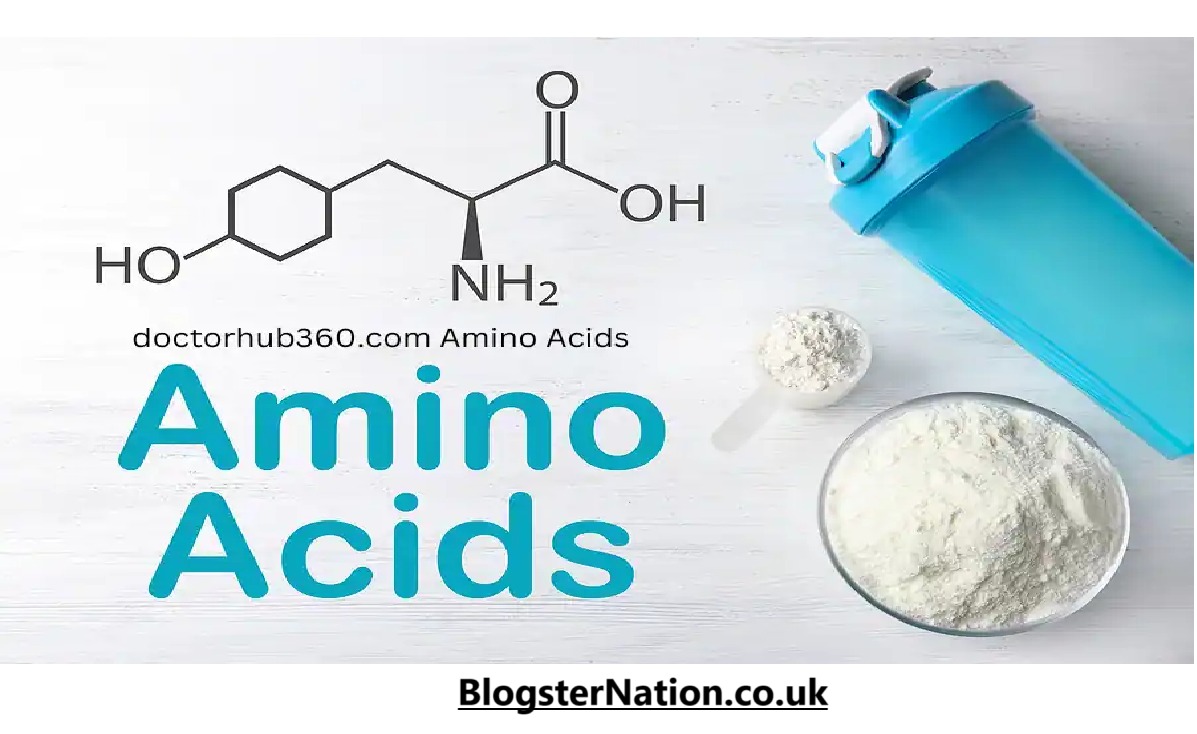Doctorhub360.com Amino Acids: Types, Benefits and Sources

Amino acids are the building blocks of proteins, playing a vital role in the human body’s growth, repair, and overall health. From muscle recovery to mental well-being, these organic compounds are essential for maintaining optimal physical functions. At Doctorhub360.com Amino Acids, we are committed to providing you with the knowledge to make informed decisions about your amino acid consumption.
In this article, we will explore into the types of amino acids, their benefits, eating sources, and how Doctorhub360.com can guide you in meeting your amino acid needs for a healthier life.
What Are Amino Acids?
Amino acids are organic molecules collected of carbon, hydrogen, nitrogen, oxygen, and sometimes sulfur. They help as the fundamental building blocks for proteins, which are important for closely every biological function. Proteins are created when amino acids link together to form long chains, which then double into specific shapes, allowing them to perform various tasks in the body.
Amino acids are categorized into three primary types:
Essential Amino Acids
These amino acids cannot be produced by the body and must be obtained through food sources. There are nine essential amino acids, including leucine, lysine, and isoleucine.
Non-Essential Amino Acids
These amino acids are produced by the body from other compounds, meaning they don’t have to be sourced from food. Examples include alanine and aspartic acid.
Conditional Amino Acids
Under normal conditions, these amino acids are non-essential. However, in times of illness, stress, or injury, they become essential. Arginine and glutamine are examples of conditional amino acids.
The Role of Amino Acids in the Human Body
Amino acids support a range of vital functions in the body. Here are some of the most significant roles they play:
Protein Synthesis
Amino acids are important for building proteins, which are necessary for muscle growth, repair, and overall cellular health. This makes amino acids particularly important for athletes, fitness enthusiasts, and those seeking to maintain thin muscle mass.
Hormone Production and Regulation
Amino acids contribute to the production of hormones like insulin and glucagon, which regulate metabolism, blood sugar levels, and other essential bodily processes.
Brain and Mental Health
Certain amino acids, like tryptophan, are ancestors to neurotransmitters such as serotonin. These neurotransmitters play a vital role in variable mood, sleep, and mental function, making amino acids essential for mental well-being.
Immune Function
Amino acids support safe function by helping in the synthesis of antibodies and the proper functioning of safe cells, which protect the body against infections. Glutamine, in particular, plays a significant role in boosting safe response, especially during periods of stress or illness recovery.
Benefits of Amino Acids for Specific Health Goals
Amino acids are essential for a wide range of health benefits. Here’s how they contribute to achieving specific health goals:
Athletic Performance and Recovery
Amino acids are vital for muscle recovery and repair after strong physical activity. Leucine, for example, stimulates muscle protein synthesis, fast-tracking recovery and muscle growth. Players trust on a firm supply of amino acids to enhance performance and reduce recovery time.
Weight Management and Metabolism
Certain amino acids, such as arginine, can help improve blood flow and enhance metabolic functions. Amino acids also support the failure of fats, making them beneficial for individuals pointing for weight management.
Skin and Hair Health
Amino acids like proline and lysine are important to collagen foundation, which helps maintain skin elasticity and promotes healthy hair. They strengthen keratin production, confirming that hair remains strong and lively.
Dietary Sources of Amino Acids
Amino acids can be found in a variety of nutritional sources, whether you’re following a plant-based or animal-based diet. Here are some of the best sources to help meet your amino acid needs:
Animal-Based Foods
- Meat: Beef, chicken, and pork are rich in complete proteins, providing all nine essential amino acids.
- Fish: Salmon, tuna, and mackerel are excellent sources of high-quality protein.
- Dairy: Milk, cheese, and yogurt offer a wide variety of amino acids.
- Eggs: Known for their high protein quality, eggs provide all essential amino acids in the ideal balance.
Plant-Based Foods
- Legumes: Beans, lentils, and chickpeas offer a good supply of amino acids.
- Nuts and Seeds: Almonds, walnuts, chia seeds, and sunflower seeds are rich in amino acids.
- Whole Grains: Quinoa, brown rice, and oats provide a balanced amino acid profile.
- Soy Products: Tofu, tempeh, and soy milk are complete proteins, making them ideal for vegetarians and vegans.
Supplements
For individuals who may struggle to meet their amino acid needs through food alone, supplements such as BCAAs (branched-chain amino acids) and essential amino acid powders can be beneficial. Doctorhub360.com Amino Acids offers expert reviews and references for the best supplements to support your nutritional goals.
How to Identify Amino Acid Deficiencies
Amino acid deficiencies can clear in several ways, affecting your energy, mood, and overall health. Some signs of lack include:
- Fatigue: Low levels of amino acids like glutamine can lead to sleepiness and low energy.
- Muscle Loss: Poor amino acid intake can result in muscle failure and loss of lean muscle mass.
- Mood Swings: A deficiency in tryptophan can disrupt serotonin levels, leading to mood uncertainty or even depression.
- Weakened Immune System: Amino acids like glutamine are vital for safe function, and a deficiency can make you more disposed to infections.
If you doubtful you have an amino acid lack, it’s important to check with a healthcare provider for further costing. Doctorhub360.com Amino Acids also provides expert resources and guidance to help you identify and address potential lacks.
How Doctorhub360.com Can Help
Doctorhub360.com is a precious resource for anyone looking to optimize their amino acid eating. We offer:
Informative Articles
Science-backed, easy-to-understand articles that explain the importance of amino acids and how to join them into your daily routine.
Personalized Guidance
Expert advice on modifying your amino acid eating to meet specific health goals, whether you’re a competitor, vegan, or recovering from an illness.
Supplement Reviews
Neutral reviews of the best amino acid supplements, helping you make informed decisions about your supplement choices.
Expert Consultations
Access to healthcare professionals who can provide personalized nutritional advice to confirm you meet your amino acid needs.
Myths and Facts About Amino Acids
Despite their importance, many traditions surround amino acids. Here’s the truth behind some common errors:
Myth 1: Plant-Based Proteins Are Incomplete
Some plant-based proteins lack one or two essential amino acids, but combining foods like beans and rice can provide a complete amino acid profile, making plant-based diets just as effective as animal-based diets.
Myth 2: More Protein Equals More Muscle
Extreme protein eating does not directly connect to increased muscle growth. A balanced eating of amino acids is more important for optimal muscle development.
Myth 3: Supplements Are Always Necessary
For most people, a well-balanced diet is sufficient to meet amino acid needs. Supplements are only necessary for individuals with specific lacks or higher needs, such as participants.
Best Practices for Ensuring Adequate Amino Acid Intake
Here are some practical tips to confirm you’re getting enough amino acids:
- Eat a Balanced Diet: Include a variety of animal and plant-based protein sources to get a wide range of amino acids.
- Monitor Intake Based on Needs: Certain individuals, like participants or pregnant women, may need more amino acids.
- Choose Quality Supplements: If you use amino acid supplements, choose honest brands with high-quality parts.
- Stay Informed: Use Doctorhub360.com Amino Acids to stay updated on the latest research and references for optimal health.
Conclusion
Amino acids are fundamental for maintaining health, supporting muscle growth, improving mental well-being, and boosting safe function. By understanding their importance and confirming a satisfactory consumption through food or supplements, you can significantly improve your overall health.
At Doctorhub360.com Amino Acids, we offer comprehensive resources to help you make informed decisions about your amino acid intake. Whether you’re a participant, a vegetarian, or simply looking to enhance your nutrition, we provide expert advice, reviews, and personalized references to support your health journey.
By adding proper knowledge, a balanced diet, and expert guidance, you can unlock the full potential of amino acids for a healthier, more alive life.
For More Updates Please Visit Us: Blogsternation.co.uk




